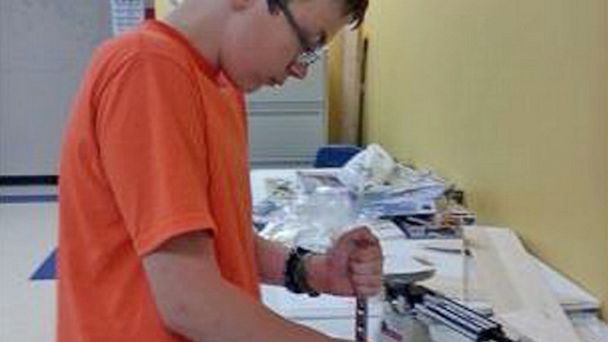Sixth Grader Wins Approval to Brew Beer in Space

6th-grader Michal Bodzianowski performs experiment that will soon test microbrewing in space. (Courtesy Sharon Combs)
Astronauts may be one step closer to kicking back with a cold one in space. And they may have a sixth grader to thank for it.
Michal Bodzianowski, 11, recently won a national competition to perform an experiment that involves brewing beer in microgravity. While it's unlikely that this will lead to keg parties on space missions, the proposal states that the objective of the trial is in preparation for a "future civilization, as an emergency backup hydration and medical source."
"He [Bodzianowski] came up with this idea all on his own," said Sharon Combs, teacher and sponsor at the STEM School and Academy in Colorado, which focuses on instruction in the sciences. "He got a book for Christmas that was about weird facts and explains how in the Middle Ages they used to drink beer because it was purer than water." The benefits for bringing beer into space are for "both medical and survival reasons, and it is fairly easy to conduct with limited human interactions," according to Bodzianowski's proposal.
The National Center for Earth and Space Science Education sponsored the competition as part of the Student Spaceflight Experiments Program. Its goal is to inspire the next generation of America's scientists and engineers. Eleven proposals, out of 744 submitted by 3,900 students, were selected for the flight and include a range of students from grades 5 to 11.
"I never expected it to be one of my sixth graders," Combs said. "But Michal's got the natural curiosity of people who go after science. He's very talented."
Bodzianowski will receive a real research mini-laboratory that is scheduled to fly on the International Space Station within the next few months from Cape Canaveral. The experiment is prepared in a small tube by Bodzianowski on the ground. Once it is launched into space, an astronaut will combine the substances and execute the plan, according to Bodzianowski's instructions. Simultaneously, he will also run the experiment on the ground to see what differences may arise. Both Bodzianowski and Combs both hope to travel to NASA for the launch.
While Bodzianowski was the "Principal Investigator" of the experiment, the school helped provide the $21,500 that will cover the cost of the launch to participate in the program. Combs and other faculty gathered sponsorship from parents and local companies, including Subaru, Raytheon, and OtterBox.
The future of brewing in space could depend largely on how this 11-year-old's experiment results. "You never know how some of these experiments can be a stepping stone to something else," Combs said. "That's how science works!"